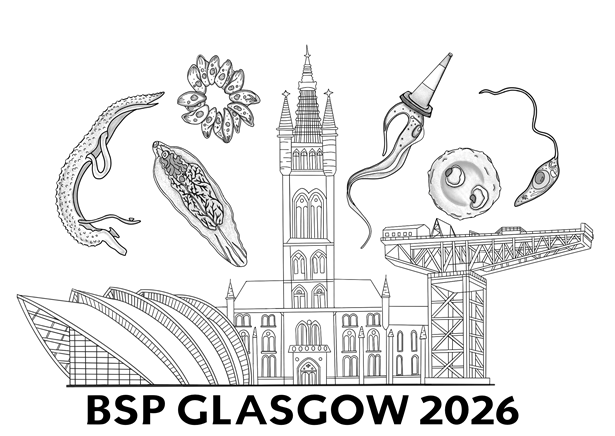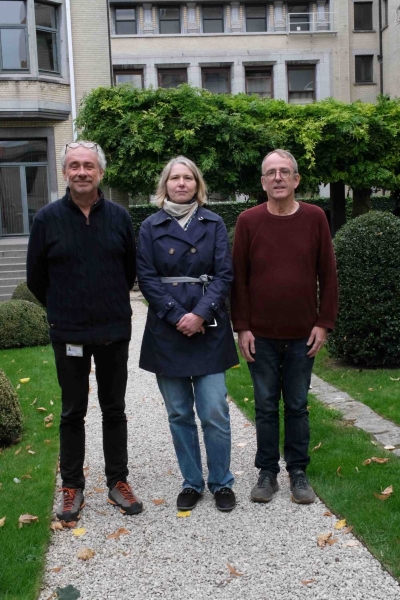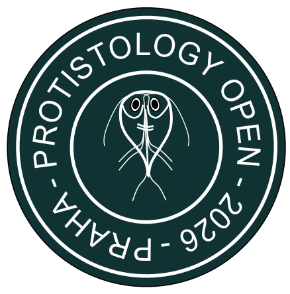Events
BSP annual meetings
The key events in the annual BSP calendar include the annual residential meetings in spring and autumn which are focused upon general and specialist aspects of parasitology.The video on the right gives a flavour of our events, which are attended by a wide range of academics, researchers and students.
BSP Spring Meeting, April 7-9, 2026. Glasgow, UK

Trypanosomiasis & Leishmaniasis Seminar, September 14-17, 2027. Antwerp, Belgium

Other events
Other organisations run events that you might find interesting: here are some up and coming online events from across the world for those with an interest in parasitology.
The British Society for Parasitology Tryps Club
Protistology Open 2026, April 19-23, 2026. Prague, Czechia.

Discover the latest breakthroughs shaping the world of microbial eukaryotes at Protistology Open 2026—a vibrant meeting uniting leading and emerging researchers across protistology, evolutionary biology, ecology, molecular biology, and bioinformatics. Explore cutting-edge science, spark new collaborations, and dive into the fundamental questions of protist diversity, function, and evolution.
Early-bird registration is now open:https://registration.cas.cz/PROTIST2026/ Closes February 20, 2026 — don’t miss the reduced rate!Celebration of the contributions of Professor Mark Field on his retirement, April 27, 2026. České Budějovice, Czechia.
- Julius Lukes, Czech Academy of Sciences
- Mike Rout, Rockefeller University
- MartinZoltner, Charles University
- Ludek Koreny, University of Cambridge
- Joel Dacks, University of Alberta
- David Horn, Dundee University
- Sam Obado, University of Washington
- Eric Schirmer, University of Edinburgh
- Sergio Schenkman, Sao Paulo Federal University
Swiss Society of Tropical Medicine and Parasitology (SSTMP) annual meeting, September 3 - 4, 2026. Neuchâtel, Switzerland

We are delighted to announce our next annual meeting, which we will organised jointly with our partner society, the Swiss Society for Tropical and Travel Medicine (SSTTM).
📅 Date: 3–4 September 2026ApicoWplexa 2026, September 16-18, 2026. Lodi, Italy.
We are delighted to announce and warmly invite you to participate to the 8th International Meeting on Apicomplexa Parasites in Farm Animals that will take place in Lodi, Italy, in 16-18 of September 2026. Organised by the Parasitology group of the Department of Veterinary Medicine and Animal Sciences, University of Milan, this biennial meeting has served as a highly active and influential forum for researchers worldwide working on Apicomplexa since 2012.
As apicomplexan parasites pose a critical challenge to the global livestock sector, we are pleased to invite you to Lodi, where the beauty of the Italian countryside meets a long-standing zootechnical tradition. This region is not only at the heart of Italian livestock production but also one of the most significant zootechnical hubs in Europe.
ApicoWplexa is known for fostering intensive scientific exchanges in a friendly atmosphere and has significantly contributed to the advancement of this dynamic research field. This enriching face-to-face event will once again provide a unique forum for researchers, scientists, students, and partners from academia, industry, and government organizations to explore the fascinating challenges apicomplexan parasites rise in livestock.
ApicoWplexa 2026 will offer an exceptional opportunity for innovation and collaboration, paving the way for future advancements in understanding and managing these parasites in farm animals. We believe that your expertise and passion in this field will greatly enrich the discussions and contribute to the success of this conference. The program will feature cutting-edge research on:
• One-Health approaches to apicomplexan diseases
• Molecular and cellular biology of apicomplexan parasites
• Host-parasite interactions and immunology
• Advances in diagnosis, epidemiology, and drug development
• Strategies for vaccines and control of infections in livestock
